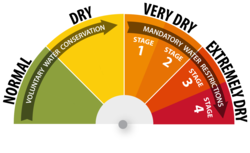Rundle Forebay Maintenance Underway
From July through October, TransAlta has been conducting essential maintenance on the Spray Canal. To allow their team to safely perform the work, they temporarily lowered water levels in the Rundle Forebay.
As of Oct. 17, 2025 ,TransAlta has completed the necessary repairs and will begin gradually refilling the canal over the coming days. Residents may notice rising water levels and crews onsite as part of this planned process.
The Rundle Forebay is a source of Canmore’s drinking water. To help manage demand on our water system, a Stage 1 Mandatory Outdoor Water Restriction will remain in place until we confirm that capacity has returned to normal levels.
Learn more about what restrictions mean for you below or learn more about this project.
Stewarding our Watershed
The Town of Canmore is fortunate to be located near the headwaters of the Bow River Basin, but we need to be ready for potential water shortages.
We monitor our watershed conditions year-round and increase monitoring from mid-May to mid-September where there is an increased risk of flooding and drought. We look at many indicators to help us predict if a drought may happen and how severe it could become, to inform our response. Some of these indicators include:
- River flows
- Mountain snowpack
- Reservoir levels and storage throughout the basin, and projected water demand
- Weather forecasts
Along with drought risk, a rapid swing to high rainfall could still lead to flood conditions in the spring. We continue to closely monitor conditions, while taking steps to be ready for both drought, flood, or other climate risks such as extreme heat that can make drought worse, and lead to wildfires and smoke.
- Be prepared for water restrictions that could take effect to respond to water shortages.
- Find out what water restriction stage is in place. Outdoor water restrictions will be announced through local media outlets, social media, and our website.
- Understand how and when you can use water outdoors. Depending on the water restriction stage, understand what mandatory actions to take. See below for details.
- Stay informed. We’re constantly monitoring our town’s water usage to determine the restriction necessary and will tell you about any changes.
- Voluntarily reduce your water use, even when mandatory restrictions aren’t in place.

Mandatory Outdoor Water Restrictions
The information we collect through our monitoring helps us carefully manage our water use to ensure that there is enough water to meet our community's essential needs, including water for drinking and fighting fires, as well as to support our neighbours and river health.
We have a mandatory outdoor water restrictions program that will allow us to call on all Canmore water users to temporarily reduce their water consumption.
Mandatory restrictions apply to non-essential outdoor water use and may come into effect in the following situations:
- Less water is available, due to drought.
- We are repairing or upgrading our water treatment infrastructure or distribution infrastructure.
- Water demand is high due to hot temperatures and is straining the capacity of our water treatment plant.
There are four stages of mandatory outdoor water restrictions based on the severity of the water shortage.
| Outdoor Water Use | Stage 1 | Stage 2 | Stage 3 | Stage 4 |
| Sprinklers Between 7 p.m. and 9 a.m. |
✔️ |
✔️ 1 hr max 1 day/week |
❌ | ❌ |
| Hose Watering Gardens, trees/shrubs |
✔️ | ✔️ | ❌ | ❌ |
| Hand Watering | ✔️ | ✔️ | ✔️ | ❌ |
| Watering New Grass | ✔️ | ✔️ | ✔️ | ❌ |
| Washing Outdoors Windows, exterior building surfaces, driveways |
✔️ | ❌ | ❌ | ❌ |
| Licensed Car Washes | ✔️ | ✔️ | ❌ | ❌ |
| Filling Hot Tubs | ✔️ | ✔️ | ❌ | ❌ |
| Filling Fountains or Ponds | ❌ | ❌ | ❌ | ❌ |
| Water for Construction Grading, dust control, and hydrotesting/flushing |
✔️ | ✔️ | ✔️ | ❌ |
✔️ = Permitted
❌ = Not permitted
Who Restrictions Apply To
The mandatory restrictions apply to all Town of Canmore water utility customers, including residences, businesses and organizations, the communities of Harvie Heights and Dead Man's Flats, and Town of Canmore municipal operations, with some exceptions that allow certain customers to continue outdoor water use for health and safety reasons or for core business needs. Outdoor water restrictions apply to treated water from the Town, but does not apply to private wells or irrigation ponds.
Enforcement
These mandatory restrictions are enforceable by Water Bylaw #39-2003. They apply to all Town of Canmore water utility customers, including residences, businesses and organizations, and Town of Canmore operations, with some exceptions that allow certain customers to continue outdoor water use for health and safety reasons or for core business needs.
The restrictions apply to all Town of Canmore water utility customers, including residences, businesses, organizations, and Town of Canmore operations. There are some exceptions that allow certain customers to continue outdoor water use for health and safety reasons or for core business needs.
Exemptions include:
- Private wells or irrigation ponds
- Washing outdoor surfaces for health and safety at childcare facilities, restaurants, animal kennels etc.
- Washing of vehicles subject to health and safety regulations.
- Businesses that have a license to operate exterior window washing services.
- Watering plants, shrubs, and trees for commercial sale
- Town athletic turf – irrigation subject to best practices for concussion mitigation
For more information, contact publicworks@canmore.ca
In response to this year’s conditions, across our town's operations, we’re taking short-term and long-term steps to make every drop count and further reduce our water use. This includes:
- Developing a drought response plan
- Detecting and repairing leaks
- Replacing aging water mains and installing flow meters in major water mains to help detect leaks
Together, we can protect the water we all depend on. If we all do our part and follow the mandatory outdoor water restrictions when they’re in place, we can reduce the strain on our rivers and water treatment plant.
In the event of a major disruption to water treatment or distribution, such as a large water main break, the community may be required to further reduce our consumption by limiting both indoor and outdoor water usage.
During times of severe drought, the Province of Alberta may declare an emergency under the Water Act. In the event that an emergency is declared, we will work with the Province to issue further restrictions as required until the emergency has been resolved.
Voluntary Water Conservation
Make every drop count.
Even when mandatory restrictions aren’t in place, use water wisely. Not only will you help protect our water security and the environment, but you may see a reduction in your utility bill too!
Simple Ways You Can Help:
- Fix leaks promptly, no matter how minor.
- Use water-efficient appliances and fixtures.
- Water outdoor plants during the early morning or late evening to minimize evaporation.
- Consider using native plants in your landscaping.
- Install a rain barrel (or two) to catch and recycle rainwater.
- Be mindful of your water use, both indoors and outdoors.
- Learn more about how to use our water wisely
